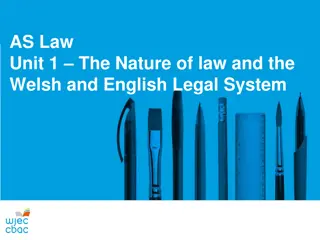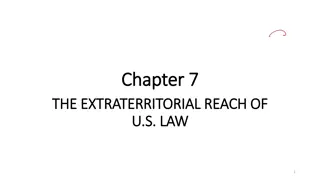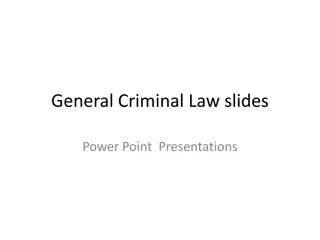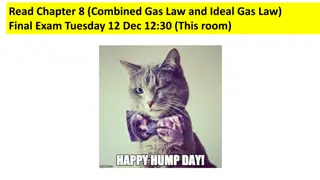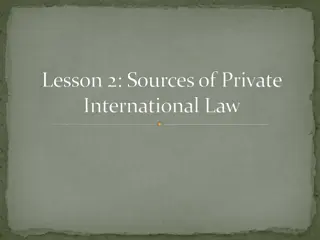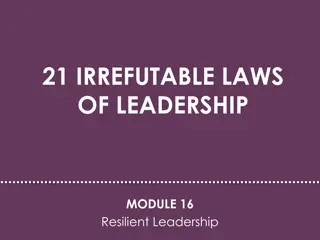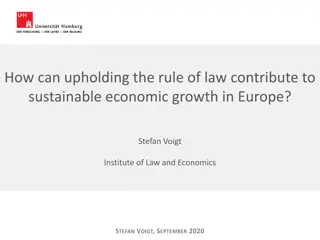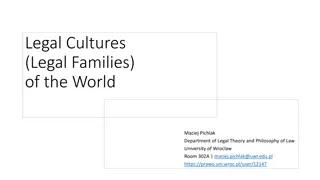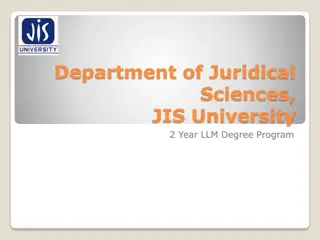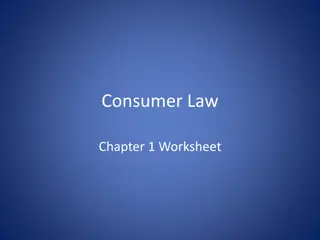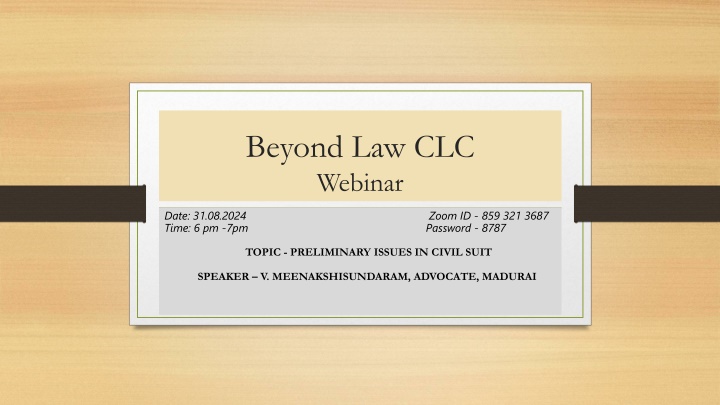
Preliminary Issues in Civil Suits: Key Considerations for Legal Proceedings
Explore the significance of preliminary issues in civil suits, including limitations, jurisdiction matters, and the interplay between law and facts. Gain insights from legal precedents and expert discussions in this informative webinar.
Download Presentation

Please find below an Image/Link to download the presentation.
The content on the website is provided AS IS for your information and personal use only. It may not be sold, licensed, or shared on other websites without obtaining consent from the author. If you encounter any issues during the download, it is possible that the publisher has removed the file from their server.
You are allowed to download the files provided on this website for personal or commercial use, subject to the condition that they are used lawfully. All files are the property of their respective owners.
The content on the website is provided AS IS for your information and personal use only. It may not be sold, licensed, or shared on other websites without obtaining consent from the author.
E N D
Presentation Transcript
Beyond Law CLC Webinar Date: 31.08.2024 Time: 6 pm -7pm Zoom ID - 859 321 3687 Password - 8787 TOPIC - PRELIMINARY ISSUES IN CIVIL SUIT SPEAKER V. MEENAKSHISUNDARAM, ADVOCATE, MADURAI
CITATION 2022 (8) SCC 401 CAUSE TITLE Saranpal Kaur Anand Vs Praduman Singh Chandhok And Others GIST When decision on issues of law depend upon decision on issues of fact, the issue of law should not be decided as a preliminary issue. However, when the issue of law can be adjudicated on admitted facts , the court can decide the issue of law as a preliminary issue under Order 14 Rule 2 CPC. 1. Issue of limitation can be decided as preliminary issue when it is based on admitted facts. 2.When facts about issue of limitation are disputed it cannot be decided as a preliminary issue. 3. A mixed question of law and fact cannot be decided as preliminary issue. AIR 2019 SC 5125 Nusli Neville Wadia v.Ivory Properties and others
CITATION CAUSE TITLE GIST 2015 (6) SCC 412 Foreshore Coop. Housing Society Ltd. D.Desai Order 14 Rule 2 of CPC - Before Amendment 2. Issue of law and of fact. Where issues both of law and of fact arise in the same suit, and the court is of opinion that the case or any part thereof may be disposed of on the issues of law only, it shall try those issues first, and for that purpose may, if it thinks fit, postpone the settlement of the issues of fact until after the issues of law have been determined. v. Praveen Order 14 Rule 2 of CPC - After Amendment (2) Where issues both of law and of fact arise in the same suit, and the court is of opinion that the case or any part thereof may be disposed of on an issue of law only, it may try that issue first if that issue relates to (a) The jurisdiction of the court, or (b) A bar to the suit created by any law for the time being in force, and for that purpose may, if it thinks fit, postpone the settlement of the other issue until after that issue has been determined, and may deal with the suit in accordance with the decision on that issue.
CITATION CAUSE TITLE GIST AIR 2006 SC 3672 Ramesh B. Desai & Ors v. Bipin Vadilal Mehta & Ors. 1. The code confers no jurisdiction upon the court to try a suit on mixed issue of law and facts as a preliminary issue and where the decision on issue of law depends upon decision of fact, it cannot be tried as a preliminary issue. 2. A plea of limitation cannot be decided as an abstract principle of law divorced from facts as in every case the starting point of limitation has to be ascertained which is entirely a question of fact. A plea of limitation is a mixed question of law and fact.
CITATION CAUSE TITLE GIST 2012 (5) CTC 705 S.N.S.Sukumaran vs C.Thangamuthu (1) The Tamil Nadu Court Fees and Suits Valuation Act, 1955 (Section 12) enacted by the State Legislature on a subject covered by the Concurrent List, albeit inconsistent S.N.S.Sukumaran vs C.Thangamuthu on 27 September, 2012 Indian Kanoon - http://indiankanoon.org/doc/191732005/ 21 with the provisions of the Code of Civil Procedure (Order XIV, Rule 2) and being in compliance with the requirement of Constitution of India, having been given assent by the President of India, shall prevail over the provisions of the Code of Civil Procedure. (2) When a defendant comes forward with a case pleaded in the written statement questioning the correctness of the valuation of the suit property and payment of court fee and asks the Court, by an application, to decide it first before deciding the suit on merits, then a duty is cast upon the Court under Section 12(2) of the State Act to first decide the objection before deciding the suit on merits. Article 254 of the
CITATION CAUSE TITLE GIST 3) However, before proceeding to decide the objection with regard to valuation and court fee as provided under Section 12(2) of the State Act, the Court shall prima facie satisfy itself, on perusal of the pleadings of the parties and the materials brought on record, that the objection raised by the defendant has substance. (4) Such objection with regard to improper valuation of the suit and insufficiency of court fee shall be entertained by the Court only before the hearing of the suit on merits commences and witnesses are examined. Section 12(2) of the State Act makes it clear that such objection shall be heard and decided before evidence is recorded on the merits of the case. (5) Exercise of right by the defendant as contained in Section 12(2) of the Act must be bona fide and not with an ulterior motive of dragging the suit on this issue. Hence, the Court shall not grant unnecessary adjournments in hearing of such application, and in the event the Court finds that the defendant is not diligent or co-operating with the Court in the disposal of such objection expeditiously, then the Court shall proceed with the hearing of the suit on merits and decide all issues, including the one relating to the valuation of the suit and the adequacy or otherwise of court fee, together
IMPORTANT PROVISIONS 1. Section 9 of CPC - Courts to try all civil suits unless barred The Courts shall (subject to the provisions herein contained) have jurisdiction to try all suits of a civil nature excepting suits of which their cognizance is either expressly or impliedly barred. [Explanation I]. A suit in which the right to property or to an office is contested is a suit of a civil nature, notwithstanding that such right may depend entirely on the decision of questions as to religious rites or ceremonies. [Explanation II]. For the purposes of this section, it is immaterial whether or not any fees are attached to the office referred to in Explanation I or whether or not such office is attached to a particular place.] Section 21 of CPC - Objections to jurisdiction. (1) No objection as to the place of suing shall be allowed by any Appellate or Revisional Court unless such objection was taken in the Court of first instance at the earliest possible opportunity and in all cases where issues are settled at or before such settlement, and unless there has been a consequent failure of justice. (2) No objection as to the competence of a Court with reference to the pecuniary limits of its jurisdiction shall be allowed by any Appellate or Revisional Court unless such objection was taken in the Court of first instance at the earliest possible opportunity, and, in all cases where issues are settled, at or before such settlement, and unless there has been a consequent failure of justice. (3) No objection as to the competence of the executing Court with reference to the local limits of its jurisdiction shall be allowed by any Appellate or Revisional Court unless such objection was taken in the executing Court at the earliest possible opportunity, and unless there has been a consequent failure of justice. 2.
3. Order 7 Rule 10 of CPC - Return of plaint - (1) Subject to the provisions of rule 10A, the plaint shall] at any stage of the suit be returned to be presented to the Court in which the suit should have been instituted. 1 [Explanation. For the removal of doubts, it is hereby declared that a Court of appeal or revision may direct after setting aside the decree passed in a suit, the return of the plaint under this sub-rule.] (2) Procedure on returning plaint. On returning a plaint, the Judge shall endorse thereon the date of its presentation and return, the name of the party presenting it, and a brief statement of the reasons for returning it.
4. Order 7 Rule 11 of CPC - Rejection of plaint - The plaint shall be rejected in the following cases :- (a) where it does not disclose a cause of action; (b) where the relief claimed is undervalued, and the plaintiff, on being required by the Court to correct the valuation within a time to be fixed by the Court, fails to do so; (c) where the relief claimed is properly valued, but the plaint is returned upon paper insufficiently stamped, and the plaintiff, on being required by the Court to supply the requisite stamp-paper within a time to be fixed by the Court, fails to do so; (d) where the suit appears from the statement in the plaint to be barred by any law; (e) where it is not filed in duplicate; (f) where the plaintiff fails to comply with the provisions of rule 9: [Provided that the time fixed by the Court for the correction of the valuation or supplying of the requisite stamp-paper shall not be extended unless the Court, for reasons to be recorded, is satisfied that the plaintiff was prevented by any cause of an exceptional nature from correcting the valuation or supplying the requisite stamp-paper, as the case may be, within the time fixed by the Court and that refusal to extend such time would cause grave injustice to the plaintiff.]
5. Order 8 Rule 2 of CPC - New facts must be specially pleaded The defendant must raise by his pleading all matters which show the suit not be maintainable, or that the transaction is either void or voidable in point of law, and all such grounds of defense as, if not raised, would be likely to take the opposite party by surprise, or would raise issues of fact not arising out of the plaint, as, for instance, fraud, limitation, release, payment, performance, or facts showing illegality. Order 14 Rule 1 of CPC - Framing of issues.- (1) Issues arise when a material proposition of fact or law is affirmed by the one party and denied by the other. (2) Material propositions arc those propositions of law or fact which a plaintiff must allege in order to show a right to sue or a defendant must allege in order to constitute his defence. (3) Each material proposition affirmed by one party and denied by the other shall form the subject of distinct issue. (4) Issues are of two kinds: (a) issues of fact, (b) issues of law. (5) At the first hearing of the suit the Court shall, after reading the plaint and the written statements if any, and 1 [after examination under rule 2 of Order X and after hearing the parties or their pleaders], ascertain upon what material propositions of fact or of law the parties are at variance, and shall thereupon proceed to frame and record the issues on which the right decision of the case appears to depend. (6) Nothing is this rule requires the Court to frame and record issued where the defendant at the first hearing of the suit makes no defence. 6.
7. Order 14 Rule 2 of CPC - . Court to pronounce judgment on all issues. (1) Notwithstanding that a case may be disposed of on a preliminary issue, the Court shall, subject to the provisions of sub-rule (2), pronounce judgment on all issues. (2) Where issues both of law and of fact arise in the same suit, and the Court is of opinion that the case or any part thereof may be disposed of on an issue of law only, it may try that issue first if the issue relates to (a) the jurisdiction of the Court, or (b) a bar to the suit created by any law for the time being in force, and for that purpose may, if it thinks fit, postpone the settlement of the other issues until after that issue has been determined, and may deal with the suit in accordance with the decision on that issue.
8. Order 15 Rule 3 of CPC - Parties at issue. (1) Where the parties are at issue on some question of law or of fact, and issues have been framed by the Court as hereinbefore provided, if the Court is satisfied that no further argument or evidence that the parties can at once adduce is required upon such of the issues as may be sufficient for the decision of the suit, and that no injustice will result from proceeding with the suit forthwith, the Court may proceed to determine such issues, and, if the finding thereon is sufficient for the decision, may pronounce judgment accordingly, whether the summons has been issued for the settlement of issues only or for the final disposal of the suit: Provided that, where the summons has been issued for the settlement of issues only, the parties or their pleaders are present and none of them objects. (2) Where the finding is not sufficient for the decision, the Court shall postpone the further hearing of the suit, and shall fix a day for the production of such further evidence, or for such further argument as the case requires.
9. Order 20 Rule 5 of CPC - Court to state its decision on each issue. In suits in which issues have been framed, the Court shall state its finding or decision, with the reasons therefor, upon each separate issue, unless the finding upon any one or more of the issue is sufficient for the decision of the suit. 10. Order 41 Rule 23 of CPC - Remand of case by Appellate Court. Where the Court from whose decree an appeal is preferred has disposed of the suit upon a preliminary point and the decree is reversed in appeal, the Appellate Court may, if it thinks fit, by order remand the case, and may further direct what issue or issues shall be tried in the case so remanded, and shall send a copy of its judgment and order to the Court from whose decree the appeal is preferred, which directions to re-admit the suit under its original number in the register of civil suits, and proceed to determine the suit; and the evidence (if any) recorded during the original trial shall, subject to all just exceptions, be evidence during the trial after remand.
11. Section 12 (2) of The Tamil Nadu Court-Fees and Suits Valuation Act, 1955 - Decision as to proper fee in other Courts (1) In every suit instituted in any Court other than the High Court, the Court shall, before ordering the plaint to be registered, decide on the materials and allegations contained in the plaint and on the materials contained in the statement, if any, filed under section 10 the proper fee payable thereon, the decision being however subject to review, further review and correction in the manner specified in the succeeding sub-sections. (2) Any defendant may, by his written statement filed before the first hearing of the suit or before evidence is recorded on the merits of the claim but, subject to the next succeeding sub-section, not later, plead that the subject-matter of the suit has not been properly valued or that the fee paid is not sufficient. All questions arising on such pleas shall be heard and decided before evidence is recorded affecting such defendant, on the merits of the claim. If the Court decides that the subject-matter of the suit has not been properly valued or that the fee paid is not sufficient, the Court shall fix a date before which the plaint shall be amended in accordance with the Court's decision and the deficit fee shall be paid. If the plaint be not amended or if the deficit fee be not paid within the time allowed, the plaint shall be rejected and the Court shall pass such order as it deems just regarding costs of the suit.
(3) A defendant added after issues have been framed on the merits of the claim may, in the written statement filed by him, plead that the subject-matter of the suit has not been properly valued or that the fee paid is not sufficient. All questions arising on such pleas shall be heard and decided before evidence is recorded affecting such defendant, on the merits of the claim, and if the Court finds that the subject-matter of the suit has not been properly valued or that the fee paid is not sufficient, the Court shall follow' the procedure laid down in subsection (2). Explanation. - Nothing in this sub-section shall apply to a defendant added as a successor or a representative in interest of a defendant who was on record before issues were framed on the merits of the claim and who had an opportunity to file a written statement pleading that the subject-matter of the suit was not properly valued or that the fee paid was not sufficient. (4) (a) Whenever a case comes up before a Court of Appeal, it shall be lawful for the Court, either of its own motion or on the application of any of the parties, to consider the correctness of any order passed by the lower Court affecting the fee payable on the' plaint or in any other proceeding in the lower Court and determine the proper fee payable thereon. Explanation. - A case shall be deemed to come before a Court of Appeal even if the appeal relates only to a part of the subject-matter of the suit.
(b) If the Court of Appeal decides that the fee paid in the lower Court is not sufficient, the Court shall require the party liable to pay the deficit fee within such time as may be fixed by it. (c) If the deficit fee is not paid within the time fixed and the default is in respect of r. relief which has been dismissed by the lower Court and which the appellant seeks in appeal, the appeal shall be dismissed, but if the default is in respect of a relief which has been decreed by the lower Court, the deficit fee shall be recoverable as if it were an arrear of land revenue.( (d) If the fee paid in the lower Court is in excess, the Court shall direct the refund of the excess to the party who is entitled to it. (5) All questions as to value for the purpose of determining the jurisdiction of Courts arising on the written statement of a defendant shall be heard and decided before evidence is recorded affecting such defendant, on the merits of the claim.Explanation. - In this section, the expression "merits of the claim" refers to matters which arise for determination in the suit, not being matters relating to the frame of the suit, misjoinder of parties and causes of action, the jurisdiction of the Court to entertain or try the suit or the fee payable but inclusive of matters arising on pleas of res judicata, limitation and the like.







